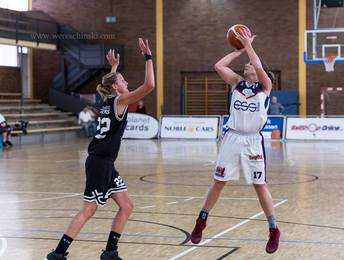|
Hello, I am Erin Bratcher. I currently play professional basketball in Germany. I have played sports at a high level for many years now. I am what you consider highly athletic and on the verge of highly trained. All my workouts and work load over the past 8 years have been very specialized for basketball. This is from the start of college into my years in the pro's. My experience before college in training was to get the most adaptation to prepare me to play at a high level. So in short words NOT to specialize. My training at a young age included playing many sports and well as many athletic activities that didn't relate to basketball. I see more and more kids these days playing a singular sport at a younger and younger age. Continue reading to find out why you're setting your child up for burnout or even worse overuse injuries. Specialization in Sport
Athletics are changing with the times, and we are seeing new trends; some good, some bad. One in particular is the idea of specializing in a single sport. People might think if they focus on only one sport and dedicate themselves to it, their athletic ability overall will improve. Parents may think this of their children. But in truth, it is better for an athlete to play multiple sports, because doing so produces greater athletic development and a much higher adaptation to the motor recruitment patterns of athletics. Eighty-eight percent of all college athletes, for example, come from a multi-sport background. If you recall a statistic from this past years super bowl, nearly 75% of the athletes on the field played more than one sport throughout high school. Examples of these athletes today would be Steph Curry (web.com golf tour, NBA superstar), Julius Peppers (collegiate basketball and football player), Aaron Judge (Current rookie MLB home run leader, all state in basketball and football in high school). Keeps the Body and Mind Guessing As with most things, when you do something the same way often enough, habits form and the mind doesn't have to work as hard. Think of riding a bike; learn the skill, and it stays with you forever. But in some cases, lack of variety can cause the body and mind to disengage, and when that happens you can lose your creative edge. When your mind is actively involved with the athletic process, you inevitably get more out of it. Think of it as hammering a bent nail into wood. If you keep driving it from the nail head, it will not go in straight. But if you continuously tap from all sides as you're driving the nail in, you can get it in straight. Interval training is a well-respected, proven method of strength training involving various stages. The athlete works through one stage for X number of weeks (typically four), then moves to a different stage and different level of cardiorespiratory and RPE. The switch in levels forces the athlete’s body to adapt, while giving other areas of the body time to rest and recover. This same concept can be applied to playing multiple sports. The athlete is able to engage areas that may have been dormant and rest others that may be over-stressed. Statistics back this up. Kids who specialize in one sport are up to 93% more likely to become injured, and these injuries are most often due to overuse. When you are designing a college strength program you work through micro cycles that develop different metabolic adaptations. These periods or micro cycles usually last about 6-weeks before moving on to something different that requires your body to adapt. In high school, I played softball and basketball. Basketball was tough, especially on the ankles, knees, and hips from all the jumping, cutting, and sprinting. Softball wasn’t so physically taxing, which meant I was able to concentrate on other areas of the game. I played shortstop and caught with my left hand, which in turn, helped me dribble the ball better in basketball. In softball, I learned how to slide and dive for the plate, and that rugged play helped toughen me on the basketball court. Softball was also a lot of fun to me. I earned All-State player honors and was awarded Player of The Year in both sports. Later, when I focused on basketball in college, my softball days spent in the dirt weren’t wasted. They proved to be a beneficial training tool I carried with me. Eliminates Boredom and a Plateau When routine takes over and there is little or no variation, an athlete’s performance will tend to plateau. Less challenge often means less competitive edge—and athletes need that edge to push them to perform at a higher level. Athletes can get “burned out” at a young age, but with the variety that comes from multiple sports, burnout is less likely. Granted, in some cases athletes could spend all day every day playing their respective sport and never get bored. Even in these cases, however, variety benefits their overall performance. At times, I would get wrapped up in basketball, constantly working on my shot, grinding day in and day out, and it was during these times I would develop bad habits without realizing it. I would start to drift, fade, and make mistakes. But stepping away from a sport, even briefly, and then returning to it can actually help prevent mistakes. The mind and attitude are refreshed, and progress is attainable in a more productive way. Brings Back the Fun in Sports Enjoying what you do is the key to success in any endeavor. So often, kids and parents alike put pressure on themselves or each other to succeed in sports, to break records, earn that scholarship, get their name in the paper—and these goals can overshadow the fun factor. At any age, fun must be the priority. Yes, you have to take yourself seriously in practice and exert all your effort, but you also have to feel grateful to do what you do and appreciate the fun. Taking a moment to breathe in the external forces of the nature of sports is important, but with so much pressure on performance, this can be hard to do. Taking a step back into a less serious situation is one way to find this crucial peace of mind and to remind yourself it doesn't always have to be so serious. Being a true athlete goes well beyond your one field of play. While developing skills in another sport may not seemingly apply to your main sport, they can in fact help you become a well-rounded athlete. There are often unpredictable things that happen in games. When true athletes are put in these situations, not only are they able to respond and react to the situation better, but they are at much lower risk of injuring themselves—and ultimately, that is the most important element. Read more about specialization in sports and studies on this at: http://changingthegameproject.com/is-it-wise-to-specialize/
1 Comment
Joanne
8/24/2017 03:25:38 pm
I have always believed this and raised my kids as all around athletes. It served them well.
Reply
Leave a Reply. |
AuthorsJoseph Pearson Archives
November 2020
Categories |
HoursBy Appointment
|
Telephone(984) 204 6295
|
|
Address
|


 RSS Feed
RSS Feed